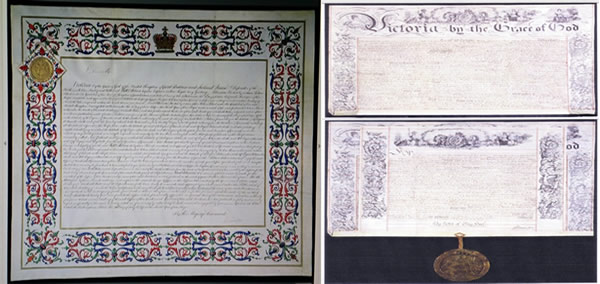My columns of the previous two weeks have been my personal quest to make 2022 the “Year of Reality” in the recounting of the history of New Zealand, especially in respect of the increasing efforts at deliberate misinterpretation/distortion of the intent and spirit of the Treaty of Waitangi.
This week, thanks to Helen Moseley and Ross Baker of One New Zealand Foundation (ONZF), comes a cruncher: the Treaty was NOT the founding document of our nation, but merely a necessary prelude.

This is what ONZF has shown, certainly to my satisfaction:
Our true founding document and first constitution that founded New Zealand was Queen Victoria’s Royal Charter/Letters Patent dated the 16 November 1840. It was issued by, Victoria by the Grace of God under, the Great Seal of the United Kingdom of Great Britain and Ireland.
The Royal Charter of 1840 allowed New Zealand to separate from New South Wales dependency and with the consent of the British Parliament and became a British Colony on the 3 May 1841 with its own Governor and Constitution for “Creating and establishing a Legislative Council and an Executive Council, and for granting certain powers and authority to the Governor” to set up a Government to make laws based on English law under the watchful eye of the British Parliament.
http://onenzfoundation.co.nz/an-amazing-achievement-by-britain/
I urge you all now to go on and read the full text at this link:
especially this extract:
There is no doubt the Government and some part-Maori do not want this document made pubic as it would show how the people of New Zealand have been misled by their politicians and governments since the 1975 Treaty of Waitangi Act and the apartheid Waitangi Tribunal it created. Queen Victoria’s Royal Charter/Letters Patent is our Founding Document and first Constitution as confirmed by the New Zealand Gazette Notices below.
Gazette Notices and Proclamations that made New Zealand into an Independent British Colony.
THE NEW ZEALAND GOVERNMENT GAZETTE.
PUBLISHED BY AUTHORITY)No 12]
KORORAREKA BAY OF ISLANDS, MAY 6, 1841 [ GRATIS.
DECLARATION OF THE INDEPENDENCE OF NEW ZEALAND, AND THE
APPOINTMENT OF HIS EXCELLENCY, CAPTAIN WILLIAM HOBSON, RN
AS GOVERNOR IN CHIEF IN AND OVER THE SAME.
In my mind this is incontrovertible proof that the legal, constitutional date of the birth of New Zealand as a nation was 3 May 1841, and, accordingly, we should transfer what we celebrate on 6 February every year to 3 May, and re-name it, either New Zealand Day or in a well-deserved nod to our first settlers, Iwi Kotahi Day (iwi Kotahi standing for One United Tribe, which was undoubtedly the spirit that motivated signatories on both sides of the tables).
February 6 1840 at Waitangi was an important day and place in the constitutional process, but it was only a prelude (and a necessary prelude) to the Royal Charter/Letters Patent which gave effect to the final birth of our nation.
Apart from the recognition of the reality of our history that such a change of date would involve, is the question of how to do it?
It is safe to assume that those temporarily in charge of our government in Wellington, the party that is now Labour in name only, having long since departed from the principles that underlay its first assumption of office in 1935, wouldn’t have a bar of such a change.
And, sadly, I have to say, a similar disregard for its founding principles by the main opposition party, National, makes one wonder whether under its latest spin of leadership it would have the moral courage to simply legislate in Parliament when it wins by default in 2023.
The only other alternatives, both of which would require a stiff dose of moral fortitude are either:
- A special constitutional convention, as discussed by distinguished political commentator Chris Trotter here:
http://bowalleyroad.blogspot.com/2022/02/thoughts-on-waitangi-day-2022.html
or
- A referendum
Whatever the process, it should address also the question of whether there is any longer a need for the Waitangi Tribunal and the increasingly questionable gravy train it has created.
The end of that tribunal was effectively signalled by ex-Prime Minister Jim Bolger in 1991, when, after National’s resounding win in the 1990 General Election, he inaugurated the programme of full and final Treaty settlements to compensate for confiscations of Maori land that had clearly breached the spirit of the Treaty of Waitangi, and followed that up with the master stroke of entrusting implementation to Doug (now Sir Douglas) Graham.
Interesting, isn’t it, to reflect on how many settlements have been achieved under National-led governments, thanks initially to Doug Graham and, more recently, Chris Finlayson, that almost all land and taonga confiscations have now been settled, except for the dissonant hapu of Ngapuhi who might be moved to get their iwi act together if there is a suggestion that the Tribunal’s days are numbered.
Whatever, there is a need for early and urgent action before the public mood turns from the indignant impatience currently on view in the grounds of our Parliament and turns more ugly and less in tune with our No 8 wire, “she’ll be right” traditional Kiwi attitudes. Labour will be finished in 2023, if they last that long, but, in the meantime, National needs urgently to rediscover and re-enact its own founding principles, moral fortitude, and find some leadership while it still retains enough support to be a viable political force.
